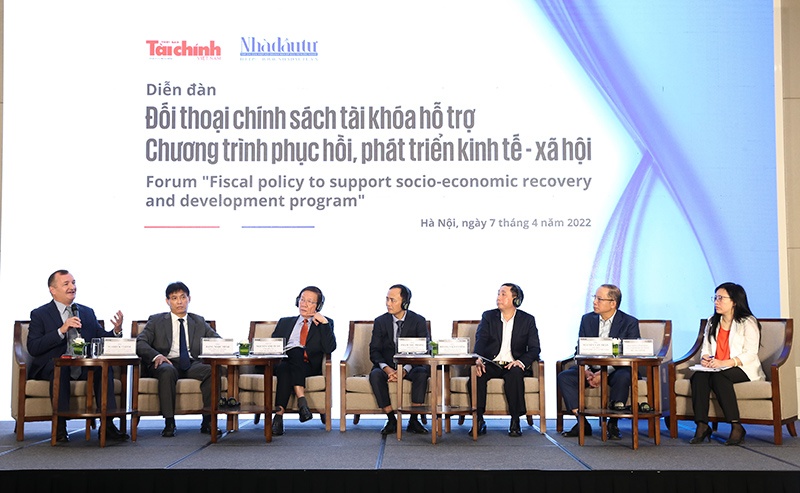Telling the Vietnam story in order to boost country’s economic momentum
 |
| Warrick Cleine, chairman and CEO of KPMG in Vietnam and Cambodia |
You have just returned to Vietnam from a conference in London on the new era of digital transformation and green transition. How do you measure international investor sentiment towards Vietnam’s economic and financial landscape at the moment?
The sentiment in London was very positive and you could see that investors are interested in contributing to and benefiting from Vietnam’s success.
In terms of specific sectors, foreign investors are exploring a number of manufacturing bases or looking to start businesses in Vietnam. That group has been very enthusiastic about the country throughout the pandemic. The key to this interest is the government’s success in concluding trade agreements, along with the investment environment in the country. I think we should expect to see real investment commitment from this group in the coming years.
The second group is the capital market investors in the stock market. We are seeing increased confidence in Vietnamese management. As long as there are high-quality companies on the market with good corporate governance and transparent financial reporting, we will see continued interest from foreign groups investing in listed companies in Vietnam.
One thing which is still in progress is to qualify for the emerging markets index so that more investment funds can allocate capital to the Vietnamese market. That might take a year or two, but there’s a lot of ambition from the securities regulator to make sure Vietnam qualifies for that.
The third group is private equity investors or institutional investors. This group is more driven by government policy. As we saw in London, there is a lot of money in the form of private equity investors, banks, and others seeking to increase their exposure to Vietnam.
Even though Vietnam’s economy has shown remarkable resilience, challenges still colour the landscape. What is your assessment of how the government is supporting economic recovery through fiscal policies?
 |
It’s fortunate that the Vietnamese government has not had to spend a lot of stimuli other than on healthcare to keep the economy stay open and resilient, which means they have the financial resources now to respond in the recovery phase. This is fortunate because governments around the world don’t have that luxury. As we see today, the stimulus package that they’ve announced is quite significant. 5 per cent of GDP is a big investment.
As mentioned by Minister of Finance Ho Duc Phoc, this will be spent on both long-term projects like infrastructure and healthcare, as well as some immediate short-term measures like helping people back to work in the industrial sector, helping with employee housing, helping with the booster shot vaccine programme, and more.
And importantly, through VAT reduction and fuel price control, the government is helping Vietnamese consumers by managing inflation. While the world is worried about inflation at the moment, Vietnam’s inflation is under control. The fiscal stimulus really focuses on reducing inflationary pressure, like cutting VAT and managing fuel prices. I think this is a well-balanced, well-timed package that recognises short, medium and long-term impacts, with an emphasis on the sectors damaged by the pandemic in the last two years.
If we reach 6-7 per cent growth as projected, that means good employment, rising incomes, rising asset prices, and the government having more revenue to invest in infrastructure. I am hopeful about the future of Vietnam’s economic growth.
Do you have any further recommendations for Vietnam to maintain its growth momentum at the moment?
In recent times, we’ve seen Vietnam’s leaders visiting international markets and telling the Vietnam story. The global capital market is competitive, and Vietnam has to attract investors. So it’s good that we are seeing active engagement from these leaders in the business community and with other governments globally.
I think telling the Vietnam story is really important. We saw a lot of enthusiasm at the investment event in London which was organised by the Vietnamese government, which is a clear sign that a lot of positive things are coming out of that storytelling.
Investors don’t like surprises – they like consistency. The government has been efficient at putting out the roadmap for reforms, but it’s important not to make mistakes. We have seen in some areas lately, like the Labour Code, how a mistake can become quite damaging and how it’s better to get it right the first time.
That said, some recommendations would be advance notice of the changes while continuing to ask for opinions and incorporating those opinions into the policies. We saw in today’s forum that everyone has opinions and wants to be heard. So it’s important for the government to continue that process of consultation and engagement and not surprise people.
And finally, while the pandemic situation is normalising, it requires confidence to maintain the course on opening. The government needs to prioritise not going backwards on border control because that will be damaging for people and for businesses. We need to get foreign investors back on planes coming into Vietnam to look at investment opportunities.
As part of the effort towards economic recovery and attracting multinational companies, the government has started a number of tax initiatives, including the current launch of the new portal for overseas groups. What is your take on this initiative?
The big picture is that the global tax system is not really designed very well for the modern world. For instance, some multinational corporations, particularly in the e-commerce sector, have global operations and are conducting business in Vietnam without a physical presence in the country. It is such a daunting task that every government across the globe is attempting to respond to this dilemma.
As a result, everyone is striving to answer the question, “How can we create an appropriate tax system to cope with the new world economy?”.
Our KPMG tax experts have been involved in relevant discussions and the Ministry of Finance has been quite receptive to the international initiatives.
I believe the proposal coming out of the ministry indicates Vietnam’s bold commitment to following international practices in this regard. Vietnam is ahead of other countries as the new portal provides a mechanism for these companies to comply with Vietnamese tax laws while they are not present in the country. The worldwide community, including the global e-commerce industry, want to comply with all laws applicable to the sector in which they’re doing business, and the portal provides a means for them to do so.
As the portal has just been launched a few weeks ago, we have to keep an eye on things. It will take some time to observe how the tax mechanism evolves, how compliance develops, and how it all comes together. I think it should be viewed in the context of the broader digital strategy of the government.
In a taxpayer-friendly move, Vietnam has accelerated paperless tax practices to reduce the need for physical contact, as evidenced by e-invoicing, online filing, and online tax payments. Data collection from these digital-based platforms would help local authorities to defy taxpayers who are paying their fair share of taxes, how they find businesses to audit, and so on.
Taxpayers will need to be more compliant, more understanding of the laws and legal changes, and more understanding of what their industry is doing.
What the stars mean:
★ Poor ★ ★ Promising ★★★ Good ★★★★ Very good ★★★★★ Exceptional
Related Contents
Latest News
More News
- Five tech predictions for 2026 and beyond: new era of AI (December 11, 2025 | 18:16)
- CONINCO announces new chairman and CEO (December 10, 2025 | 11:00)
- How AWS is powering the next-gen data era (December 09, 2025 | 13:14)
- Outlook in M&A solid for Singapore (December 08, 2025 | 10:31)
- Vietnamese firms are resetting their strategy for global markets (December 05, 2025 | 17:04)
- LPBank Securities accelerates AI and data innovation with AWS (December 05, 2025 | 09:00)
- Improving traceability capacity with Zebra Technologies (November 26, 2025 | 10:08)
- Ho Chi Minh City engages 500 CEOs in dialogue on building global megacity (November 25, 2025 | 16:00)
- CEO shares insights on Phu My 3 IP’s journey to green industrial growth (November 17, 2025 | 11:53)
- NS BlueScope CEO highlights decade of sustainable steel efforts (November 15, 2025 | 10:00)

 Tag:
Tag:





















 Mobile Version
Mobile Version